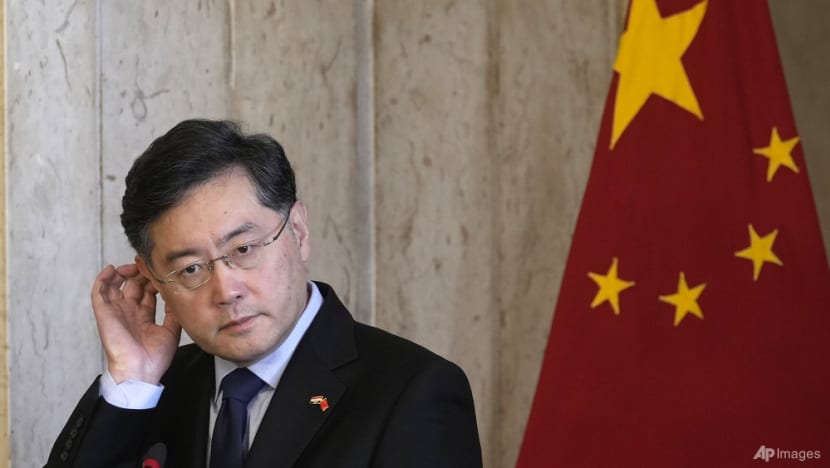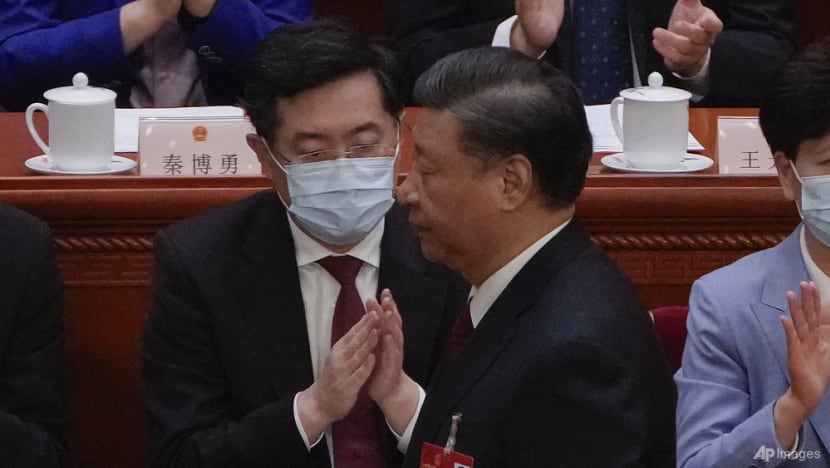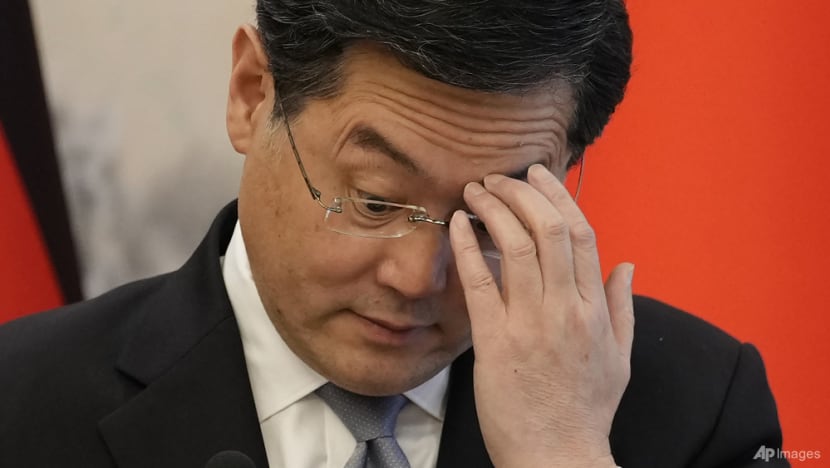From alleged torture, suicide to demotion: Why China's disgraced foreign minister Qin Gang’s fate is fodder for speculation
Analysts say uncovering the reasons for Mr Qin's removal and his current status could provide hints into the inner workings of the world’s second-largest economy.


This audio is generated by an AI tool.
SINGAPORE: Torture. Even suicide. These are some of the fates that have allegedly befallen China’s former foreign minister Qin Gang, according to Western media reports, since his abrupt ouster last July.
The latest claim, by The Washington Post citing sources, is relatively tame - that Mr Qin is alive, but has been demoted to a low-level publishing job. This was quickly refuted by a Hong Kong media outlet, citing its own sources.
Analysts say the heightened Western speculation over Mr Qin’s status is tied closely to geopolitics - particularly escalating US-China tensions, which have seen both sides at odds on issues like trade, Taiwan, as well as the hot wars between Russia and Ukraine, and Israel and Hamas.
“These Western platforms may be attempting to divert attention from other pressing issues, such as the ongoing conflicts in Ukraine and Gaza, which might cast a negative light on the US itself, said Mr Einar Tangen, a senior fellow at the Beijing-based Taihe Institute.
“By focusing on China, they shift scrutiny away from these issues,” he told CNA.
Related:
While observers note that Beijing’s silence on Mr Qin has contributed to the rumour mill, they point out that it is this very opacity by the Chinese party and state that is driving keen interest, considering his closeness to President Xi Jinping and the senior roles he held before his downfall.
“Understanding the reasons behind his removal and his current status could provide valuable insights into China's diplomatic direction and possible internal power shifts,” Associate Professor Alfred Wu from the National University of Singapore’s Lee Kuan Yew School of Public Policy (LKYSPP) told CNA.
ONE MAN, MULTIPLE FATES
Mr Qin assumed the role of China’s foreign minister in late December 2022 at the age of 56. Before that, he served as China’s ambassador to the US for approximately 18 months.
The once-rising political star has not been seen in public since Jun 25, 2023, when he held talks with counterparts from Russia, Sri Lanka and Vietnam. His absence from the annual foreign ministers’ meeting of the Association of Southeast Asian Nations (ASEAN) a month later was explained by Chinese officials as due to “health reasons”.
On Jul 25, 2023, a decree signed by President Xi Jinping formally announced Mr Qin’s dismissal from his post. His predecessor Mr Wang Yi retook the role. Mr Qin retained his position as a state councillor - an elite post within China’s Communist Party (CCP).
Since then, notable Western media outlets have reported on his possible fate.
A Wall Street Journal article published on Sep 19, 2023, reported that he had engaged in an extramarital affair during his tenure as ambassador to the US, resulting in the birth of a child.
The report, citing two unnamed sources, claimed that Qin was under investigation to determine whether his conduct or the relationship had compromised national security.
On Dec 6 of the same year, American political digital newspaper Politico, citing two unnamed sources “with access to high-level Chinese officials”, reported that Mr. Qin had died “either from suicide or torture in late July, in the military hospital in Beijing that treats China’s top leaders.”
None of these reports were subsequently confirmed or verified.
In the latest assertion, an article published on Sep 8 by The Washington Post reported that Mr Qin had been “nominally assigned to a low-level job” at World Affairs Press, a state-owned publishing house affiliated with the Chinese foreign affairs ministry. The reported cited two unnamed former US government officials.
"The demotion … occurred sometime in the spring, (it) signifies a ‘fall from grace’ but also means (Mr Qin) is ‘off the hook,’ the report quoted the sources as saying. “He’s not going to jail, but his (political) career is over.” they added.
Hong Kong newspaper Ming Pao published a story two days later, citing sources from the publisher confirming that it does have an employee named Qin Gang, but clarified that it is not the former foreign minister, only someone with the same name.
Speculation about Mr Qin is partly fuelled by the Chinese government's tendency to withhold information, leaving gaps that others rush to fill, analysts say.
“Qin’s disappearance symbolises the opaque nature of Chinese elite politics, which often lacks transparency. Western media are interested in these dynamics because they shed light on the power struggles and internal challenges within China’s ruling party,” noted Assoc Prof Wu.
Mr Tangen said the inconsistencies between the two reports highlight that “very few people actually have reliable facts about Qin Gang’s status”.
He noted that while speculation is partly driven by the Chinese government’s opacity and secrecy, it is “frivolous” of some media outlets in “passing off news reports based on hearsay”.
“If I go to your house and I look from the outside and I hear some shouting, I can't start speculating that you beat your wife. It's not useful, whatever (Qin Gang) did was within the party,” added Mr Tangen.
GEOPOLITICS AT PLAY: ANALYSTS
Mr Qin’s rapid promotion through the ranks indicates an “unusual relationship” with President Xi Jinping, which is why his case continues to be closely monitored, said Dr Lance Gore, senior research fellow at the National University of Singapore’s East Asian Institute.
Mr Qin was head of protocol for China’s foreign ministry from 2014 to 2017. He was subsequently promoted to vice minister of foreign affairs in 2018, and then appointed as ambassador to the US in 2021. After serving in Washington for just 18 months, he returned to Beijing to lead the foreign ministry.
Mr Qin was one of several prominent "wolf warrior" diplomats, referring to the aggressive and confrontational style of public diplomacy adopted by China in recent years.
Observers note that a geopolitical dimension is at play, especially against the backdrop of rocky US-China tensions.

Mr Tangen, founder of Asia Narratives, asserted that some Western media have long sought to portray China in a negative light, not just in relation to Mr Qin’s disappearance.
He suggested that these platforms may be trying to divert attention from issues that may portray the US in a negative light. Citing the ongoing conflicts in Ukraine and Gaza as examples, he explained that by focusing on China, attention is shifted away from them.
Assoc Prof Wu from LKYSPP concurred, adding that the intense interest in Mr Qin also reflects the escalating Sino-US competition.
“As a former foreign minister, Qin Gang was expected to play a pivotal role in shaping China’s foreign relations,” he said, adding that understanding why Mr Qin was removed and uncovering his current status could provide hints into the inner workings of the world’s second-largest economy.
NOT BOUND BY PRECEDENT?
The Washington Post article on Sep 8 noted that Mr Qin’s apparent demotion mirrors that of former assistant foreign minister Shen Guofang, who was abruptly reassigned in 2005 to a role as editor-in-chief at WAP.
“No reason was given for his move, but it was rumoured that he was being punished for an affair,” stated the piece. It added that Mr Shen maintained a public profile in his new position and claimed ignorance about the reasons for his reassignment.
Mr Qin, a foreign ministry spokesperson at the time, described the transfer as “routine”, the report said.
There is a precedent in China of government officials being removed from their positions due to mistakes and quietly reassigned to other roles, analysts point out.
This includes Mr Zhou Mingwei, who served as deputy director-general of the Chinese Communist Party’s Taiwan Affairs Office - a role equivalent to a vice minister - from Jul 2000 to Dec 2003. He was later reassigned to the Foreign Languages Publishing Administration as its deputy director, a move widely seen as a demotion.
The South China Morning Post in a report published on Dec 30, 2003, said the reassignment came after Mr Zhou was criticised ”for failing to prevent (then) Taiwan President Chen Shui-bian from pushing through with his referendum timetables and for losing the initiative in cross-strait relations”.
Another example is Mr Hao Tiechuan, who served as the publicity director of the central government’s liaison office in Hong Kong from August 2009 to May 2014.
According to media reports, Hao’s controversial remarks often sparked heated debates within society and sometimes required corrections from city officials. He was subsequently reassigned as director of the Shanghai Research Institute of Culture and History, a move widely viewed as a demotion as well.

Even so, analysts say Mr Qin’s case is unusual and cannot be compared to such past examples.
“(Qin Gang’s) case is more complicated. I am not optimistic about his return to normal work.” said Assoc Prof Wu.
“He had access to highly sensitive and classified information in his previous roles as foreign minister and ambassador to the US, so the government would be cautious of any risk of leaking state secrets when considering his next assignment.
“A role with open access, such as at a publishing house, is therefore unlikely.”
Assoc Prof Wu pointed out that in some of the past cases, alternate work was arranged so the officials could continue contributing. “But in Mr Qin’s case, he simply vanished and never resurfaced,” he noted.
He believes the case is severe and caused significant embarrassment to the Chinese government, and that it is unlikely Mr Qin will reappear in the public sphere.
During the CCP’s third plenary session in July, a statement announcing Mr Qin’s resignation from the national legislature and removal from the party’s Central Committee continued to refer to him as “comrade” or “tongzhi” in Chinese.
The term is commonly used among CCP members, and analysts seized on what appeared to be deliberate wording to speculate that he had not been expelled from the party and by extension, had not committed criminal wrongdoing.
Assoc Prof Wu views the speculation as premature. To him, the term does not reveal any hints about the severity of Mr Qin’s actions or the extent of possible wrongdoing.
“Investigations could still be ongoing,” he pointed out.
While the central government has kept mum on the matter, “it does not mean that nothing is happening behind the scenes”, he said.
















